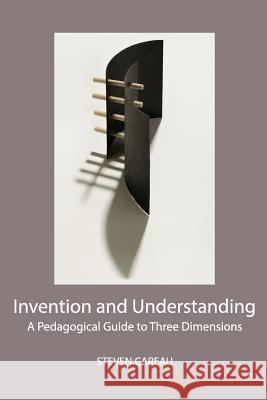Invention and Understanding: A Pedagogical Guide to Three Dimensions » książka
Invention and Understanding: A Pedagogical Guide to Three Dimensions
ISBN-13: 9780988637696 / Angielski / Miękka / 2013 / 76 str.
Focusing on the undergraduate classroom, this book presents a rational and systematic approach to both understanding and inventing three-dimensional art. Starting with questions such as "How big is it?" "Where is it?" and "What is it made of?" the author first presents a logical approach to understanding what we experience when we encounter a three-dimensional work of art. Fundamental to the approach are observation and thinking-observing physical reality, and thinking about what is observed. The questions, simply and directly stated, engage the rational mind and serve to unlock information that helps students grasp the essential nature of their experience. In the second part of the book, the author presents a series of projects designed to enhance the inventive abilities of students in the fine arts classroom. The method that emerges seeks to rationally guide students' intuitive responses and to expand and deepen the foundation upon which students make creative decisions. As they move beyond comfortable and familiar responses, students come to question their intuitive sense of rightness and thus develop greater intellectual and artistic adventurousness. Focusing on the undergraduate classroom, the book is intended to be a pedagogical guide for college art teachers, graduate students in the arts who wish to teach, and educational professionals interested in pedagogy. "Using a step-by-step approach, this artist-teacher utilizes his experience to guide readers through the process of looking, thinking, and ultimately making... This book will be a great resource to artists, teachers, and anyone who takes the process of engaging art seriously." ―G. James Daichendt, Professor of Art History, Azusa Pacific University; Chief Editor, Visual Inquiry: Learning and Teaching Art. "Invention and Understanding is an intelligent presentation of how creativity works, how it can be advanced, and how it can be taught... Yes taught. Careau offers a succinctly written, jargon-free guide for those interested in pursuing creative work as art teachers and art students. While his book is specifically designed for work in three dimensions, Careau's ideas can have a more far-reaching effect for creative explorations beyond the visual arts." ―David Raymond, Professor of Fine Arts, and Director, McCoy Gallery, Merrimack College. "Steve Careau's book is a clear, straightforward, and much-needed introduction to sculpture, in fact all forms of three-dimensional design. It focuses not on the craft aspects, nor on the art historical background, but goes right back to the fundamentals of looking and making... I cannot recommend this book too highly." -William Tucker, Member of the Royal Academy of Arts and author of The Language of Sculpture. "Careau inspires confidence in one's own ability to see with a more discerning eye, and reveals exciting new aesthetic possibilities in the forms and materials of the world around us. His book should prove to be not only indispensably useful to the teacher of three-dimensional art-making but also an enlightening pleasure to read in itself for the general public." -Lydia Davis, Professor of Humanities, SUNY Albany and recipient of the Man Booker International Prize.
Focusing on the undergraduate classroom,this book presents a rational and systematic approach to both understanding and inventing three-dimensional art. Starting with questions such as "How big is it?" "Where is it?" and "What is it made of?" the author first presents a logical approach to understanding what we experience when we encounter a three-dimensional work of art. Fundamental to the approach are observation and thinking-observing physical reality, and thinking about what is observed. The questions, simply and directly stated, engage the rational mind and serve to unlock information that helps students grasp the essential nature of their experience.In the second part of the book, the author presents a series of projects designed to enhance the inventive abilities of students in the fine arts classroom. The method that emerges seeks to rationally guide students intuitive responses and to expand and deepen the foundation upon which students make creative decisions. As they move beyond comfortable and familiar responses, students come to question their intuitive sense of rightness and thus develop greater intellectual and artistic adventurousness.Focusing on the undergraduate classroom, the book is intended to be a pedagogical guide for college art teachers, graduate students in the arts who wish to teach, and educational professionals interested in pedagogy."Using a step-by-step approach, this artist-teacher utilizes his experience to guide readers through the process of looking, thinking, and ultimately making... This book will be a great resource to artists, teachers, and anyone who takes the process of engaging art seriously." ?G. James Daichendt, Professor of Art History, Azusa Pacific University; Chief Editor, Visual Inquiry: Learning and Teaching Art."Invention and Understanding is an intelligent presentation of how creativity works, how it can be advanced, and how it can be taught... Yes taught. Careau offers a succinctly written, jargon-free guide for those interested in pursuing creative work as art teachers and art students. While his book is specifically designed for work in three dimensions, Careaus ideas can have a more far-reaching effect for creative explorations beyond the visual arts."?David Raymond, Professor of Fine Arts, and Director, McCoy Gallery, Merrimack College."Steve Careaus book is a clear, straightforward, and much-needed introduction to sculpture, in fact all forms of three-dimensional design. It focuses not on the craft aspects, nor on the art historical background, but goes right back to the fundamentals of looking and making... I cannot recommend this book too highly."-William Tucker, Member of the Royal Academy of Arts and author of The Language of Sculpture."Careau inspires confidence in ones own ability to see with a more discerning eye, and reveals exciting new aesthetic possibilities in the forms and materials of the world around us. His book should prove to be not only indispensably useful to the teacher of three-dimensional art-making but also an enlightening pleasure to read in itself for the general public."-Lydia Davis, Professor of Humanities, SUNY Albany and recipient of the Man Booker International Prize.











